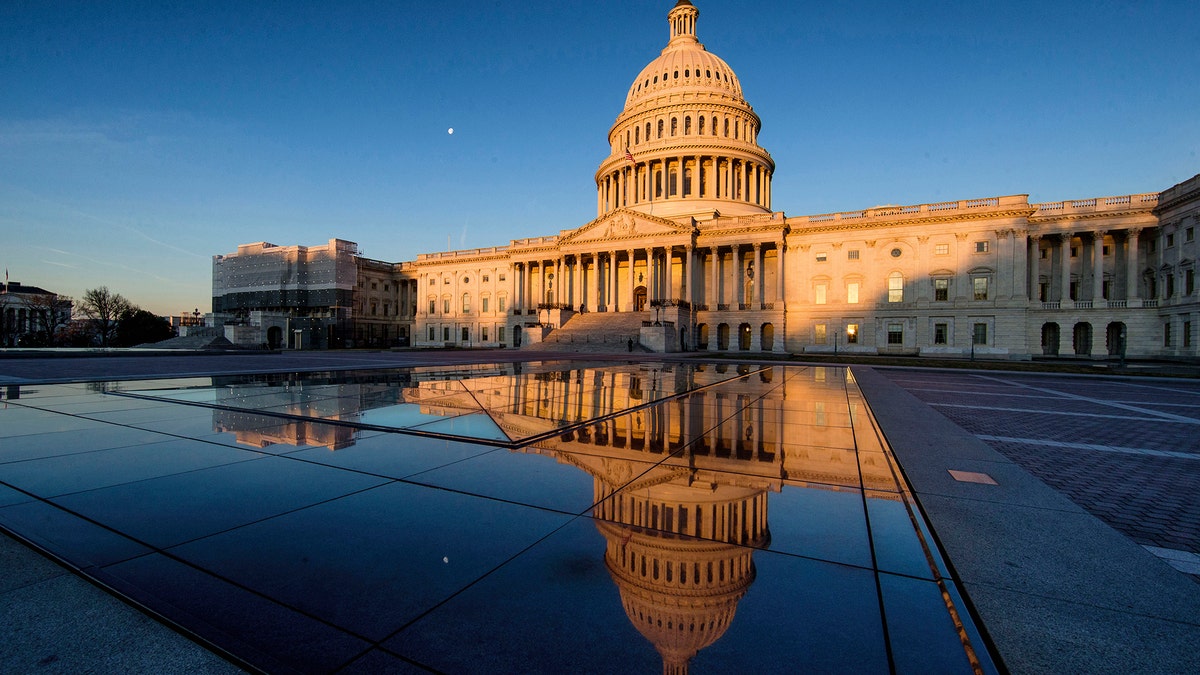
The U.S Capitol is seen at sunrise, Sunday, March 24, 2019, in Washington. (AP Photo/Alex Brandon)
Today’s political environment rarely lends itself to bipartisanship and cooperation. So when congressional leaders from both sides of the aisle come together to deliver a legislative victory for Americans, it needs to be reported fairly and honestly. Unfortunately, that doesn’t always happen. Sadly, this week’s reporting on the Taxpayer First Act is one example.
The bill, which passed the House of Representatives unanimously on April 9, will be the first reform of the agency since 1998 if it’s enacted. We’ve spent years working on this legislation, which passed the House three times before this year and nearly passed the Senate last year but for year-end politics, to achieve a worthwhile goal: making the IRS a service-first agency working on behalf of taxpayers. In other words, to make the agency a resource, not an adversary.
At the 11th hour, rumors about a so-called ban on the IRS offering free tax filing to Americans began to surface. The misinformation could be found in a story published by ProPublica, titled “Congress Is About to Ban the Government From Offering Free Online Tax Filing. Thank TurboTax.”
Many Americans pay nothing to file their federal tax returns. That’s because of what’s known as the Free File program, which allows anyone who makes under $66,000 per year to file their taxes with the help of private online software and without having to pay for it. Private companies that offer this service to assist Americans with filing their tax returns each year don’t charge them for the help. The Taxpayer First Act would simply require the IRS to maintain this existing 16-year-old program, which is available to 70 percent of American taxpayers.
ProPublica reported that this bill bans the IRS from creating its own online filing system. That is flat out wrong. The bill simply requires the agency to continue the Free File program, which it originally started without congressional direction.
The truth is that the Taxpayer First Act would require the IRS to maintain the Free File program as it has generally been run since 2002. This means the agreement the IRS entered into with tax-return-preparation companies would continue. That agreement does say the IRS agrees not to compete with these companies in offering free tax-return-preparation software, which the IRS doesn’t have the ability to do anyway.
But what the ProPublica article failed to report is that the Free File program already allows the IRS to later offer such service as long as the private companies are given notice and can get out of the deal. Furthermore, the most recent agreement made between the IRS and tax-return-preparation companies in 2018 maintains this condition. Simply put, the Taxpayer First Act doesn’t prohibit the IRS from doing anything it can’t already do other than cancel the entire Free File program outright.
The Taxpayer First Act is designed with taxpayers in mind. It will create an independent appeals board to oversee disputes between filers and the IRS, so taxpayers receive fair hearings. It will rein in the IRS and require it to respect taxpayers’ rights during investigations, preventing the seizure of property without due process. It will hold the agency accountable for taxpayer dollars used to upgrade cybersecurity measures and increase agency tools to combat identity theft. It will protect lower-income taxpayers by extending the Volunteer Income Tax Assistance Matching Grant Program (VITA), which provides them with another option for free tax-preparation assistance and ensures that the IRS can make referrals to those needing assistance to lower-income taxpayer clinics.
The Taxpayer First Act is a bipartisan victory for Americans but the fast-and-loose reporting of what it does or doesn’t do has diminished what should’ve been a clear celebration of cooperative government.
CLICK HERE TO GET THE FOX NEWS APP
The IRS should be a tax administrator, not merely an enforcement arm. That difference is more than semantic. Americans should be able to pick up the phone, go on the internet, or visit an IRS office and receive the service they deserve. The Taxpayer First Act is a huge step toward that goal, and we should be celebrating this bipartisanship win.
At a time when political partisanship seems to be at an all-time high, it’s important to highlight shared victories that benefit the American people, and it should be done without bias or agenda. The Taxpayer First Act is a significant, bipartisan achievement. It’s our hope that moving forward, it is reported with honesty and objectivity.
